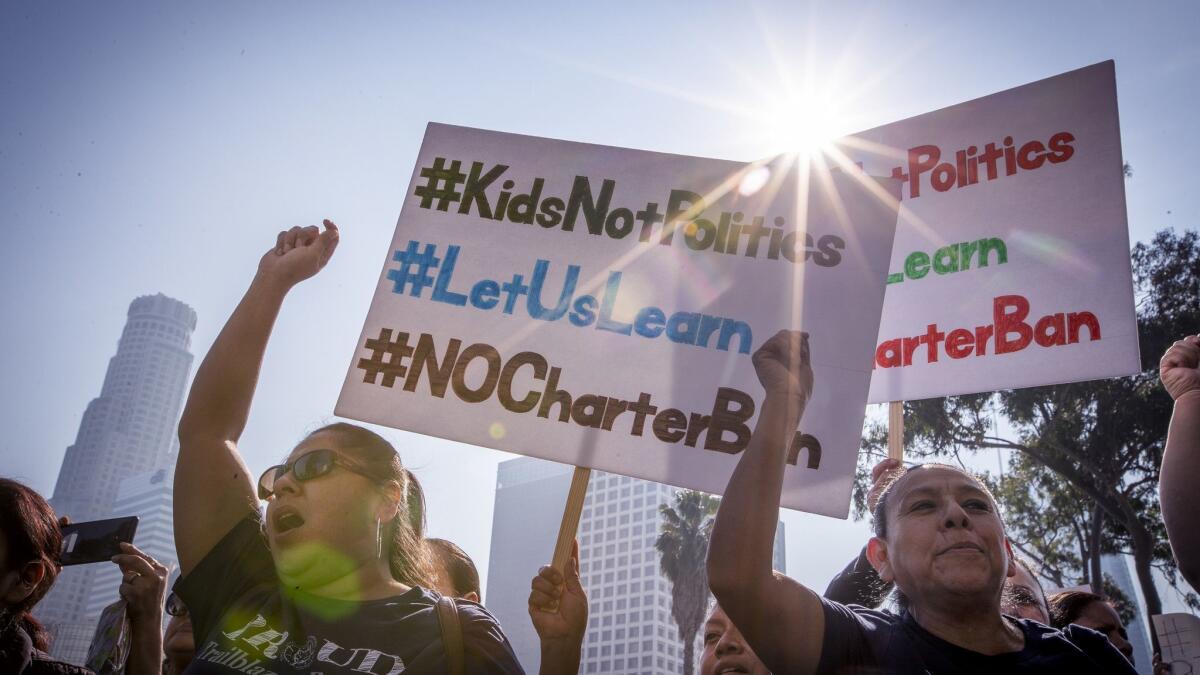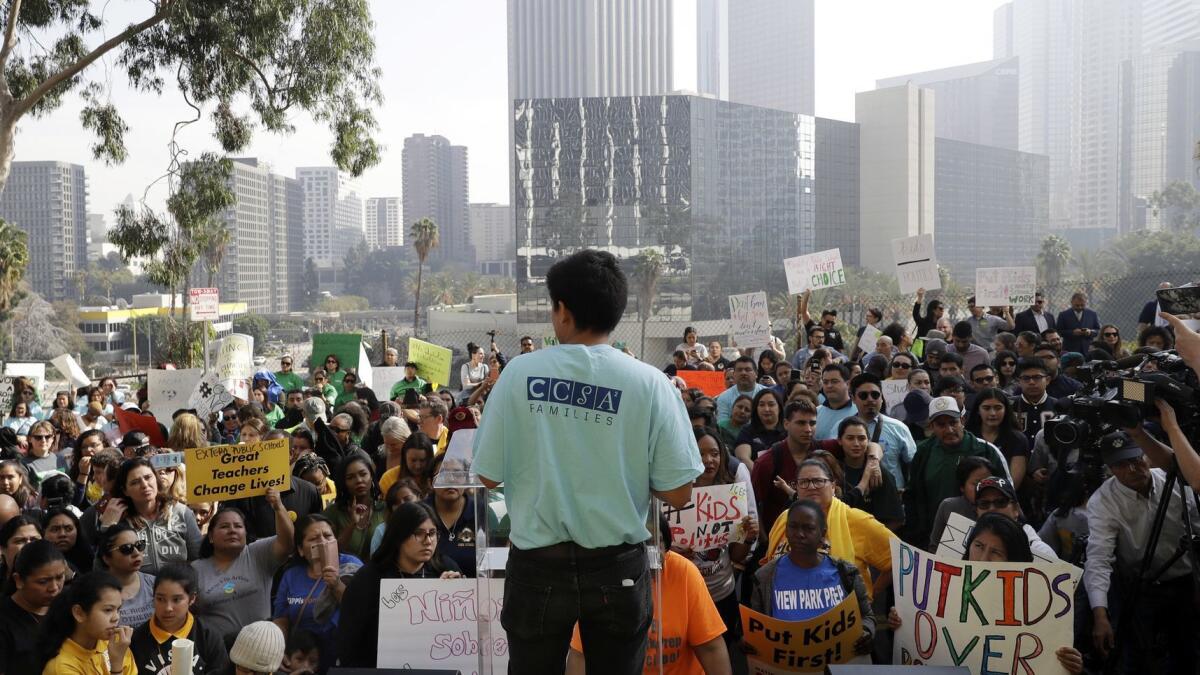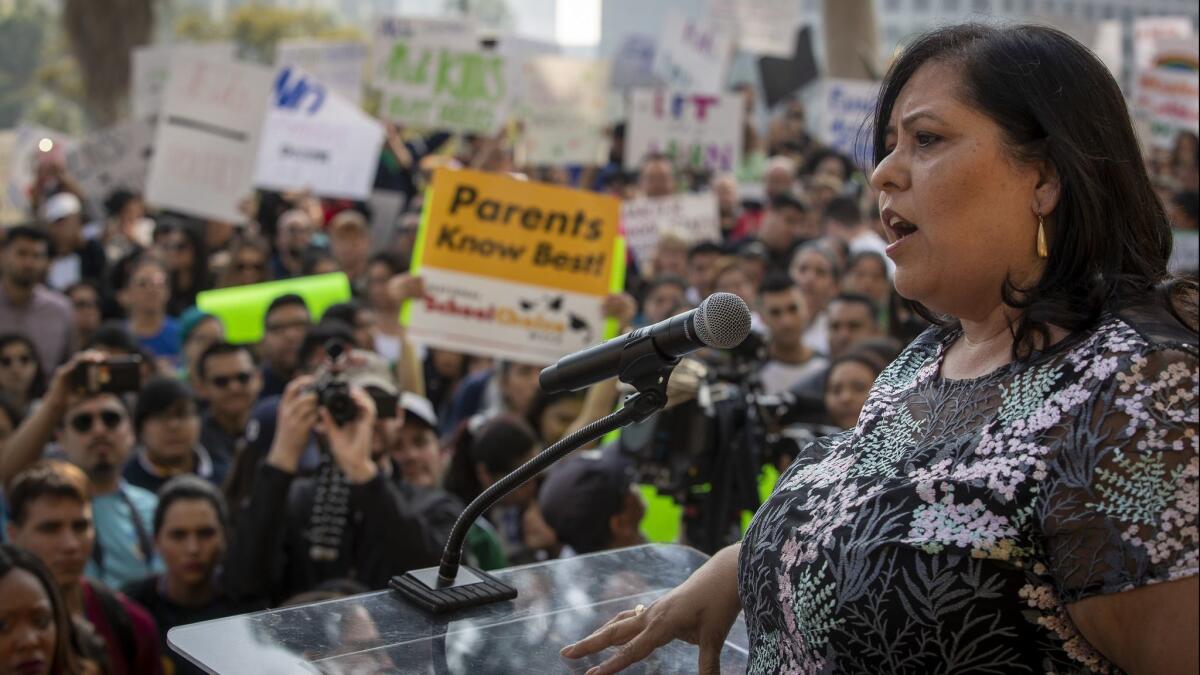L.A. school board approves teachers’ contract despite financial risks

- Share via
Los Angeles school officials on Tuesday approved a new teachers’ contract despite concerns it places the struggling system at increased financial risk, while separately backing a resolution meant to slow down the booming charter school movement that has drained students from L.A. Unified.
The sweeping actions by the Board of Education deliver on promises the district made to teachers, who staged a six-day strike earlier this month.
The contract both sides agreed on got classrooms open again. But a new analysis by the L.A. County Office of Education raised alarms about whether the district could afford the terms of the deal, with officials saying the district would eventually fall below its required reserves.
The county oversight agency stopped short of urging a rejection of the contract, but it warned L.A. Unified that it would have to submit a revised three-year budget plan.
The school district has been struggling financially due in part to the rise of charter schools, which have expanded greatly in Los Angeles and have reduced enrollment in district-run public schools.
During intense negotiations, L.A. schools Supt. Austin Beutner had agreed to bring forward a resolution calling for a moratorium on new charters in L.A. Unified until a study could be completed on how they affect traditional schools.
A moratorium would require action by state officials and so the resolution was non-binding. But district teachers pushed for it and local charter operators forcefully opposed it, with more than 1,000 charter supporters turning out Tuesday to protest outside district headquarters, just west of downtown.
As the protest took place outside, board members inside voted unanimously to approve a contract with teachers that will run through June of 2021.
As things stand, the school system appears to be unable to meet all of its budget obligations. The contract is “not sustainable on an ongoing basis,” Debra Duardo, superintendent of the Office of Education, said in a statement.
If the district does not take the necessary steps to avoid financial risk, then the county agency would appoint a fiscal advisor with the authority to override district spending decisions.
One problem with the contract that the Office of Education cited is its optimistic assumptions about state revenue projections, based on the budget proposal submitted by Gov. Gavin Newsom. The county agency objected to counting dollars that were not yet guaranteed. The state budget has yet to be approved by the Legislature.
The county also was concerned about a projection that the district’s reserve fund would fall just below legal requirements in three years. The county has expressed such concerns before, and the union, United Teachers Los Angeles, dismissed them as it has before.
L.A. schools Supt. Austin Beutner said he’s well aware of the district’s financial challenges — indeed, he had repeatedly called attention to them during contract negotiations. Still, he said, the contract was the right step forward and that all parties had compromised to get to an agreement. Resolving the labor conflict would allow all groups to focus on shared challenges, such as cutting costs, and obtaining more revenue from the state and federal government and from ballot initiatives.
“We are at a historic moment to start addressing these issues,” Beutner said. “This contract is not an end. It is a beginning.”
Board member Nick Melvoin said the district would have to make the contract pencil out: “It’s up to us, collectively, to make it sustainable.”
Teachers and their union leaders have long been concerned about the rapid growth of charters — even as district enrollment is declining overall because of population trends. Charters are privately operated public schools that compete with L.A. Unified — and with each other — for students. Most charters are non-union.
The district’s declining enrollment has created financial pressure on L.A. Unified, which has had trouble cutting costs and faces increasing burdens from underfunded programs to provide retirees with pensions and health benefits. L.A. Unified serves about 486,000 students in the schools it operates. L.A. Unified has 225 charters — more than in any other school system in the country — serving about 112,000 students.
There is no limit on how many charters can open, and some have closed because they, too, cannot attract enough students.
In the view of some, this constant competition is healthy — and likely to lead to better educational options and outcomes. Critics, including the union, insist that more effort and more resources should go toward existing schools, allowing them to remain sources of stability within their communities.
On Tuesday, dozens of charter schools pulled students from class to give them the civics lesson of assembling en masse for a rally and for impassioned speeches before the Board of Education.
The topic that triggered the fiercest response was the resolution, written by board member Richard Vladovic, calling for a state study on how charter schools affect traditional schools, as well as an eight- to 10-month local moratorium while the study is being completed.
Among the protesters was Lexi Hopp, an 18-year-old senior at Granada Hills Charter High School.
“I felt that it was important to be here today because students and families should have the choice of where to go to school,” she said. “Not every school is perfect. So every school, every family, needs to have their choice of where to send their student, to have the best fit possible for them.”

Manuel Vasquez, one of the speakers at the rally, took aim at the deal that was brokered by Beutner, union President Alex Caputo-Pearl and L.A. Mayor Eric Garcetti, who was mediating.
“I dream of a day when three old, privileged, white guys won’t bargain away our public school choice,” said Vasquez, a staff organizer for the California Charter Schools Assn., who graduated from a local charter school.
“We want charter schools!” protesters chanted, along with “parents choice!”
Some protesters said they had come to oppose a ban on charter schools, although existing charters would not be affected under the moratorium. And the district still must approve new local charters unless state officials act to change the law.
Her voice breaking with emotion, parent Roxann Nazario told board members that a moratorium would hurt her fifth-grade daughter and other students because the east San Fernando Valley has too few charter options for middle and high school students. She challenged the board to act against low-performing district schools instead.
There also were parents who testified strongly in favor of the moratorium.
Leaders of the teachers’ union had pushed hard for the resolution during negotiations, even though it was outside the scope of the formal contract. Initially, the resolution had seemed unlikely to get the four votes needed to pass. Three of the six board members were elected with substantial financial backing from charter school supporters.
But board President Monica Garcia, a charter supporter, broke ranks.
“The resolution was part of the package to end the strike,” Garcia said after the meeting. “And I supported ending the strike, and the superintendent, and the negotiating team, and all partners that brought us back.”

She added that a study might have value and that it was important for all parties to come together.
Kelly Gonez, who was elected with substantial support from charter school backers, also voted “yes.” The “no” vote came from Melvoin.
Teachers have already approved the new contract, with 81% voting “yes,” according to preliminary figures. The contract calls for a 3% raise retroactive to July 1, 2017, and an additional 3% raise that’s retroactive to July 1, 2018. Teachers gave up about 3.5% of their pay for this year by being on strike.
The deal also is supposed to provide full-time nurses at every campus, librarians at every secondary school and additional counselors at high schools. Class sizes would drop slightly next year and even more in subsequent years, provided there is enough revenue.
Twitter: @howardblume
More to Read
Sign up for Essential California
The most important California stories and recommendations in your inbox every morning.
You may occasionally receive promotional content from the Los Angeles Times.











